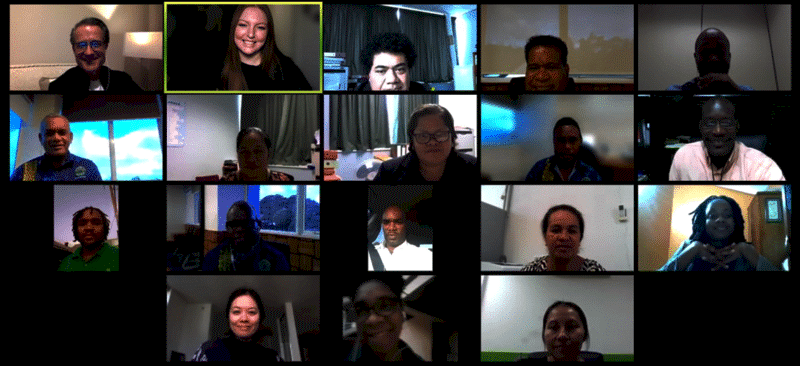Many development finance institutions (DFIs) in the Pacific and Caribbean region have the strategic objective to support their local entrepreneurs in launching, developing, and growing their businesses – both financially and non-financially – but often the banks struggle with maintaining a balance between financial sustainability and achieving impact.
In open discussions, the participants found they face common challenges and issues. The event facilitated by the CENTRE OF EXCELLENCE FOR NATIONAL DEVELOPMENT BANKS covered the following elements:
- Discussion of processes, analytical tools and approaches to manage loan portfolios, reduce Non-Performing Loans and analyse business opportinuties while maintaining risk-based pricing and institutional sustainability.
- Presentation of tools, including an instrument to assess industry, sector-specific and management risks and a portfolio risk tool which DFIs can use to monitor and report based on their own risk appetite and mandate.
- Sharing experiences on lending during Covid-19, innovative offers for SMEs and gender-sensitive approaches to programming.
- The fiduciary responsibility of the Board of Directors, Board accountability, the need for accurate financial accounting standards at all times and the resulting need for an ongoing risk assessment by lending officers.
Vibrant discussions evolved among participants on reversing Covid moratoria for existing borrowers, the often-lacking collateral among clients and the trade-off between collateral requirements and financial inclusion. Other topics explored included lessons learned in new product development, the benefits of monitoring loan disbursements closely to ensure compliance and the implications of structural subordination and prior claims on business assets where multiple lenders are involved.
Each participating institution contributed a case study examining a recently developed product/ service and/or a current success or challenge. Thereby, participants gained insights on which practices have worked or not worked in the past – and why.
One development bank showcased a project financing a family-owned hatchery and explained how they have learned from the experience to now avoid having too many non-performing loans. The DFI had provided the hatchery with financing for construction, daily operations and to establish a processing plant to increase its local market share. To address market demands for local chicken and to reduce the country’s reliance on imports, the loan was insured to de-risk the investment and approved. However, after a successful start of operations, the company faced growth and management issues. Repayment of the outstanding debt to the DFI became impossible, resulting in a non-performing loan that could not be addressed by the bank’s rehabilitation programme. The group identified and prioritised the key potential project risks, ways that these risks could have been assessed during the appraisal phase, and alternative mitigation approaches the bank could have applied.
Another DFI put forward a case study on “Promoting Financial Inclusion”. The bank outlined its broad mandate of helping new or existing small businesses to grow during the pandemic and the challenges faced, including limited funding, consumer protection, reaching remote clients, out-migration, technology and poor financial literacy among clients. In breakout sessions participants examined the applied financial model, the influence of financial inclusion on small firms’ performance and access to capital as well as the wider impact of financial inclusion on economic growth, income inequality and financial stability.
The theme of “Gender Focused Programming” was raised in a third case study, introducing a community-based initiative to extend financing for the underserved sectors and promote financial inclusion. This project targeted unemployed women and youth who had not received any form of assistance – grant or credit – from the government or other development actors. Experience demonstrated the importance of partnerships with the central bank, relevant ministries and a private insurer to implement this initiative. The DFI also highlighted the challenges in collections, collateral, fraud and outmigration of clients due to Covid-19. A lively discussion took place about the participating DFI’s current gender focused strategies, their effectiveness and lessons, as well as benefits in enhancing gender inclusion.

Beyond exchanges on technical aspects around SME Finance, the event promoted partnerships among institutions and individual participants. To continue promoting the empowerment of DFI staff, the ICR Facility will support more peer learning formats in the future. Participants have already identified several potential topics, including development impact, environmental, social and governance (ESG) risk management, tailoring of products for specific client groups, product marketing or navigating governing relationships.
If you are interested to discuss a specific topic with your peers and would like to ask the ICR Facility to facilitate the process, please contact us at INFO@ICR-FACILITY.EU.
Endnote: This publication is part of an intervention supported by the Investment Climate Reform (ICR) Facility. The ICR Facility is co-funded by the European Union (EU), the Organisation of African, Caribbean and Pacific States (OACPS) under the 11th European Development Fund (EDF), the German Federal Ministry for Economic Cooperation and Development (BMZ) and the British Council. The ICR Facility is implemented by GIZ, the British Council, Expertise France, and SNV.
The contents of this publication are the sole responsibility of the authors and do not necessarily reflect the views of the donors or the implementing partners.
The ICR Facility supports public and private stakeholders in African, Caribbean and Pacific (ACP) countries in creating a more conducive, sustainable and inclusive business environment and investment climate.
More information: WWW.ICR-FACILITY.EU
